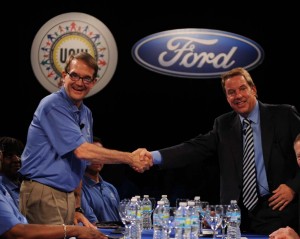
Past UAW President Bob King shakes hands with Ford Chairman Bill Ford to kick off labor talks. This time around, the process may be a little bumpy.
Ford Motor Co. and the United Auto Workers are scheduled to open negotiations in Detroit today with a special ceremony at the Detroit’s Cass Technical High School.
Over the years, relations between Ford and the UAW have been relatively peaceful, compared to those at General Motors and the old Chrysler Group, which has morphed into FCA US. There hasn’t been a strike of any kind at Ford since 1976 and today Ford actually employs slightly more union members than GM. Over the years, Ford and the UAW has simplified and expanded the profit sharing plan for union.
In addition, Ford managed to get an edge over its domestic rivals back in 2006 when it negotiated a sweeping reduction in work rules at plants in the U.S. GM and Chrysler wound up in bankruptcy before they got the same level of assistance from the union, which was concerned that both companies could disappear without the assistance of additional concessions.
UAW negotiators also have said in the past they like the notion that Ford is a family company with a solid record on hiring and promoting African Americans, a fact that has long been important to the UAW going all the way back to the 1930s.
Nevertheless, there is an excellent chance this year that the union will select Ford as its target this year and negotiations could turn quite serious as the deadline for a settlement approaches in September.
The reason comes down to one word – Mexico.
UAW President Dennis Williams, while talking about bargaining a contract that includes genuine economic gains for both new and long-term employees, also has talked about the necessity of slowing the investment in Mexico by the domestic automakers.
(Friendly FCA-UAW handshake makes tough task ahead. For more, Click Here.)
He ripped into the North American Free Trade Agreement that created the NAFTA region as automakers now describe the North American continent and opened the door to wide open to trade with the Mexico.
Ever since the NAFTA authorities have labored to make Mexico a major hub for the export of finished automobiles not only to the U.S., but also to Central and Latin America and Europe. The plan, union officials complain, has been built on a strategy of deliberately keeping the wages of Mexico’s auto workers low.
(Click Here for details about GM-UAW contract negotiations.)
In Williams’ eyes, GM, FCA and Ford have taken advantage of the situation by shifting more production to Mexico.
Ford’s recent announcement that it planned to shift production of the compact Ford Focus to Mexico only exacerbated the issue and created a potential showdown with the union. So far, the union’s response to the announcement has been relatively mild, but the announcement clearly upset the UAW’s top leadership and even jeopardized Ford’s relationship with its African American workers, many of whom have relatives working at the assembly plant in Wayne, Michigan, where the Focus is built.
(To get an overview on the issues surrounding the UAW contract talks, Click Here.)
The timing of Ford’s announcement also suggests Ford will use the promise of new product for the Wayne plant as a bargaining chip as part of a broad effort this summer to minimize the union’s economic gains in the next contract, which will put it in sharp conflict with the union’s major objectives.
